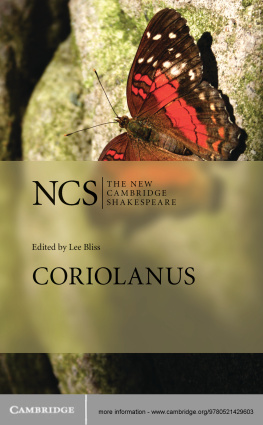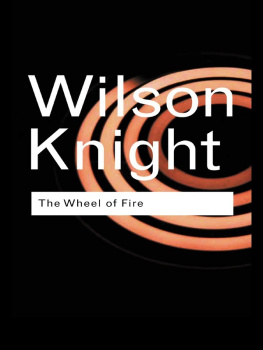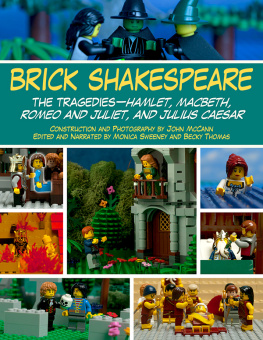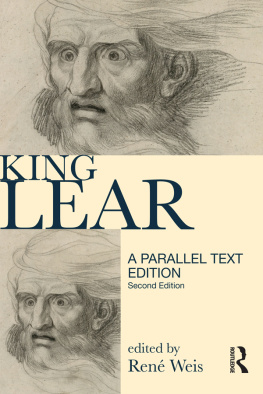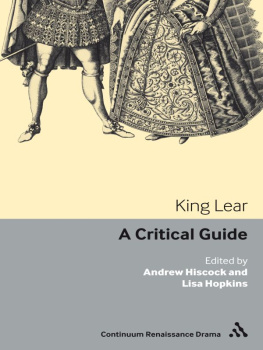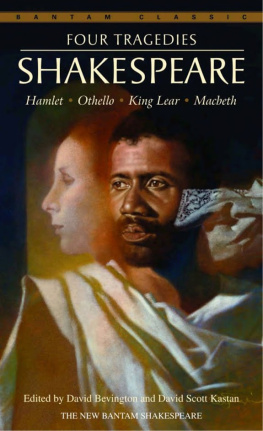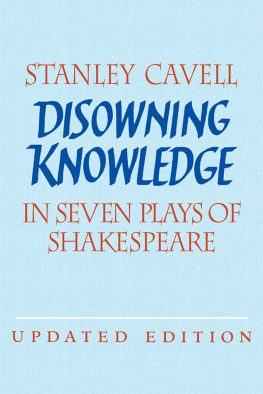A Notebook on
WILLIAM
SHAKESPEARE
BY
EDITH SITWELL

TO
ARTHUR WALEY
AND
BERYL DE ZOETE
This is my Notebook, like A Poets Notebook published in 1943, and it contains, in addition to my own notes, copious quotations from Shakespearean scholars, and passages from other works which seem to me applicable to this subject.
With the exception of the passages on Macbeth, King Lear, and Othello, the book consists of a series of notes, which are not to be considered as essays, but rather as running commentaries on certain aspects of Shakespeare.
These were written with a proper sense of humility, and awe of my subject.
I have not written of all the plays, nor is there a chronological arrangement.
E. S.
Contents
XXX. NOTES ON THE TEXTURE OF THE VERSE IN
CYMBELINE
I
The Hymn to Life
In these gigantic works, there are the differences in nature, in matter, in light, in darkness, in movement, that we find in the universe.
Sometimes the identities of which the world is composed belong, as it were, to the different grades in the series of existence, to the mineral kingdom, the vegetable kingdom, the brute creation. Or they are one of the elements: Water: Hamlet. Air: Romeo and Juliet. Fire: Lear. (Goethe said that Time is an element. Time may be said to be the other element in Lear, of whom Coleridge said old age is a character. But in King Lear, the character is more than old age: it is Time itself. Time is the essence of Lears being, the space in which that being exists.) The fourth element, Earth, is always present. Shakespeare knew that there is no fragment of clay, however little worth, that is not entirely composed of inexplicable qualities.
Characters such as Falstaffe are lumps of the world are still alive from the roots, a part not yet cut off from universal nature, and they have a gross physical enormity of sensation which approaches a kind of physical godhead.
Shakespeare is like the sun, that common-kissing Titan, having a passion for matter, pure and impure, an energy beyond good and evil, an immense benevolence creating without choice or preference, out of the need of giving birth to life. Never was there such a homage to light, to light and the principle of life.
Antony swears
By the fire
That quickens Nilus slime.
Poor Pompey, the bawds tapster in Measure for Measure, excuses himself to his judge by saying:
Truly, sir, I am a poor fellow that would live.
And Shakespeare, if no one else, forgives him, for to Shakespeare life is holy, and Pompey, Mrs. Quickly, and other earthy characters, of this, as of every other kind, hold in them the principle, and the love, of life. These, and Nilus slime, are worthy in his eyes of the light and heat of the sun.
None does offend, none, I say, none;
said the old mad King upon the dark moor. And so said his loving creator. The terrible storms of the most gigantic tragedies ever born from the heart of Man, though they are vast as the upheavals of Nature, are not blind as these. It is no fault of the sun if we wreck our world. In King Lear, in Timon of Athens, the diatribes are only the reverse side of love.
We are really for brief moments Primordial Being itself, and feel its indomitable desire for being, and joy in existence. The struggle, the pain, the destruction of phenomena appear to us something necessary considering the fertility of the universal will.
Theres sap in it yet, says Antony to his Queen before darkness falls. Sap in the event, sap in the heart of Man.
Old Falstaffe, with his heat and intemperance, his love of life, is to Shakespeare, as to Prince Hal, thou latter spring all hallowen summer.
Only that which is too cold for Hell (as was, perhaps, Iago, once a native) is condemned. Only the hard heart offends. But this, too, though it is more inflexible than marble or than the cold of death, must be investigated.
Then let them anatomise Regan, said the old outcast King, see what breeds about her heart. Is there any cause in Nature that makes these hard hearts?
To Shakespeare, generation and the processes of generation, Death and the processes of Death, are holy.
In these hymns to Life, the very blood of the beings, the animate heat, is spirit.Not fire, it does not take its origin from fire, but derives from the solar ray. The blood acquires remarkable and most excellent powers, and is analogous to the stars.
The heat of the sun and of animals, not only that which is stored up in semen, but even that of any excrementitious matter, although divers in nature, still contains a vital principle Now, continues Harvey, I maintain the same thing of the innate heat of the blood. I say that they are not fire and they do not derive their origin from fire. They rather share the nature of some other, and that a more divine body or substance. They act by no faculty or property of the elements; but as there is something inherent in the semen which makes it prolific, and as in producing an animal, it surpasses the power of the elements as it is a spirit, namely, and the inherent nature of that spirit corresponds to the element of the stars, so there is a spirit, a certain force, inherent in the blood, acting superiorly to the powers of the elements and the nature, yea, the soul in this spirit and blood is identical with the nature of the stars.
In beings like Othello, the blood, by reason of its admirable properties and powers, is spirit. It is celestial, something analogous to heaven, vicarious of heaven the innate heat, the sun of the microcosm, the fire of Plato. In such beings as Juliets nurse, in so far as it is spirit, it is the hearth, the Vesta, the household divinity.
That splendour of the blood ran through all grand animal nature, in that globe of sinful continents, poor old Sir John Falstaffe, the honeysuckle villain, the honey seed rogue, whose heart was killed because a King, in whose word he had trusted, seemed to break faith with him.
It runs in the veins of the Dauphins horse, that being of air and fire.
DAUPHIN: What a long Night is this ! I will not change my Horse with any that treades but on foure pasternes: a ha ! he bounds from the Earth, as if his entrayles were hayres: le Cheval volant, the Pegasus, chez les narines de feu! When I bestryde him, I soare, I am a Hawke: he trots the ayre; the Earth sings when he touches it; the basest home of his hoofe is more Musicall than the Pipe of Hermes.
ORLEANS: Hees of the colour of the Nutmeg.
DAUPHIN: And of the heat of the Ginger. It is a Beast for Perseus: hee is pure Ayre and Fire; and the dull elements of Earth and Water never appeare in him, but only in patient stillnesse while his Rider mounts him: hee is indeed a Horse; and all other Jades you may call Beasts.
CONSTABLE: Indeed, my Lord, it is a most absolute and excellent Horse.
DAUPHIN: It is the Prince of Palfrayes, his Neigh is like the bidding of a Monarch, and his countenance enforces Homage.
(The Life of King Henry the Fifth, III, 7)
Such plays as King Henry the Fourth (Parts I and II) and King Henry the Fifth are giant hymns to the physical glory of Life, and the characters seem the animalisation of God.
banish plumpe Jacke, and banish all the World.
(First Part of King Henry the Fourth, II, 4)
(That round berry the world, with its sweetness the world with its earthiness and juice; the old happy laughing world that forgets it must die.)
Thou knowest, said the honeysuckle villain, in the state of Innocency Adam fell: and what would poore Jacke Falstaffe do in the dayes of Villainy? Thou seest, I have more flesh than another man, and therefore more frailty (Part I, III, 3) If Sacke and Sugar be a fault, Heaven helpe the wicked: if to be old and merry be a sinne, then many an olde Hoste that I know is damned.



